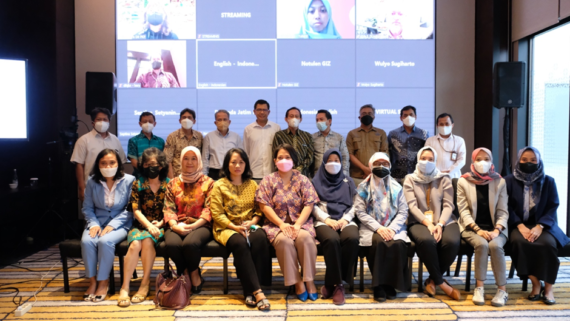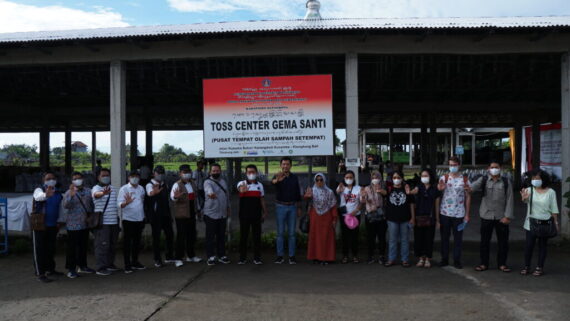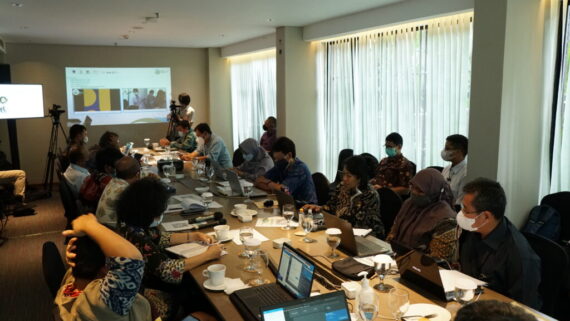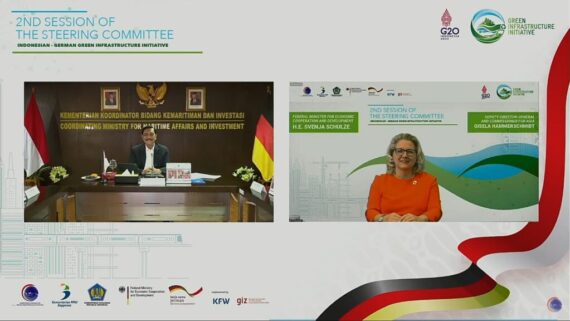Coordinating Ministry for Maritime Affairs and Investment Discusses Proposed Solid Waste Management Projects in Four Provinces in Green Infrastructure Initiative Workshop
On Tuesday, 16 November 2021, the Coordinating Ministry for Maritime Affairs and Fisheries, supported by GIZ, held a workshop on the solid waste management sector related to the Green Infrastructure Initiative. Present at this event were a number of policy makers from both the central and local government levels, including representatives from the Coordinating Ministry for Maritime Affairs: Deputy Secretary for Environmental and Forestry Management Dirhansyah Conbul, Assistant Deputy for Waste and Waste Management Rofi Alhanif, Assistant Deputy for Watershed Management and Natural Resources Conservation M.Saleh Nugrahadi, Assistant Deputy for Infrastructure and Transportation Management Rachman Hidayat, Head of Waste Management Rizal Panrelly.
This workshop aims to conduct a preliminary selection of the proposed solid waste management infrastructure projects that have been collected by four provinces, consisting of West Java, Central Java, East Java, and Bali. The results and input from this workshop will later become a reference for the Steering Committee Meeting in December
The event was opened by Deputy Assistant M. Saleh Nugrahadi. He emphasized that there is a bilateral commitment between Indonesia and Germany to finance climate change adaptation in three main sectors; water and wastewater management, solid waste management, and public transportation in urban areas. He also emphasized the importance of waste management, especially in Bali Province, considering that the G20 meeting will be held by Indonesia and will be held in Bali next year. This was echoed by Deputy Secretary Dirhansyah Conbul in his remarks
“We need to support this activity, one of which is how we show that waste management is something that is our concern. Although it may take some time to implement program activities, this is a very good step.”
Dirhansyah also suggested that the implementation of GII should not only reach the planning stage. It is also necessary to ensure its implementation; construction until it actually materializes.
The event continued with a keynote speech from the Head of Sub. Directorate of Specific Waste and Recycling Ministry of Environment and Forestry Ari Sugasri. He conveyed the progress and complexity faced by Indonesia in waste management. According to data held by the Ministry of Environment and Forestry, around 68.7 million tons of waste must be managed. Seeing this, KLHK has issued several key policies, namely PP No. 81 of 2012 concerning Household Waste Management and PP No. 27 of 2020 concerning Specific Waste Management. Ari Sugasri also said that based on the Jastrada report of the provincial and city governments, waste management increased from 2019 to 2020. The increase in waste reduction increased by 14.17% and waste handling increased by 46.31%. He also explained that there was an increase from open dumping activities to controlled landfills due to very limited land and landfill. SE Minister No. 5 of 2019 also appealed to districts and cities to make a movement to sort waste from home, manage waste from sources so that it has economic value.
On this occasion, Consultant for Solid Waste Management Sector Criteria at GII Teguh Ariyanto explained several criteria referred to in solid waste management, one of which was considering that when we do waste management we need to pay attention to the level of waste management which is like the best triangle where the focal point is located at waste management from source
Several things that were highlighted related to infrastructure projects in the solid waste management sector were the consistency in the sustainability of infrastructure projects when leadership changes at the regional level. Head of West Java BAPPEDA Ferry Sofwan Arif said that there are many challenges faced when dealing with waste problems, from the district to provincial level, so it is necessary to ensure that the sector criteria that have been made have thought about the long term so that waste management does not stop due to changes in regional leadership. GIZ consultant for the solid waste management sector, Rochim Bakti, also emphasized the commitment of each province; how in the future the province will manage the proposed infrastructure project so that it will continue to be sustainable. In addition, it is also highlighted how waste management from the source is the key to overall waste management.
Representatives from each province also explained the proposed projects for funding. West Java Province encourages the existence of a system of infrastructure facilities in TPS, TPS35, and TPST districts – cities with Majalengka as an example of waste management in the region. Central Java Province proposed the development of the Magelang Raya TPST and the improvement of the waste management system in a strategic economic area in Central Java. East Java Province proposes a TPA development plan for Kediri regional waste which has been included in Presidential Regulation 80 of 2009 and East Java Provincial Regulation No. 5 of 2012. Bali Province proposes Low Carbon Tourism Destination Island of Nusa Penida Island which includes development and replication TOSS Center or TPS3R. The province of NTT, which was invited as an observer, also expressed his opinion that it is necessary to take into account the social and cultural life of the surrounding community when conducting feasibility studies and implementing infrastructure projects.
The event was then closed by M.Saleh Nugrahadi who emphasized the purpose of this initiative is to reduce greenhouse gases and cooperation between institutions to complement each other for better implementation.
 English
English Indonesia
Indonesia





